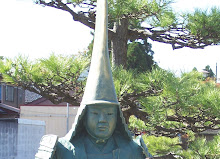One of the quickest ways for a westerner to sound like a real wacko to your average Japanese person is to explain that you practice Japanese Buddhism and Zen meditation. To the Japanese ear, the earnest daily practice of Japanese Zen Buddhism is something akin to being involved in Civil War reenactments in America - it's odd, historical and makes one seem rather "out of touch."
The disinterest in the role that Japanese Buddhist beliefs have played in Japanese history is related, on the whole, to the lowly place that Japan religion now holds. And while Japanese Buddhism isn't strictly speaking a religion, it's a spiritual outlook all the same, which contrasts strongly with the affirmative materialism that now dominates Japanese culture.
In much the same manner that school children in New England are herded onto buses and driven to Plymouth Plantation each fall to learn how the pilgrims made cornbread, Japanese high school students are brought to the local Japanese Buddhist temple and are made to sit zazen (sitting meditation on a cushion) and learn what a stark and disciplined life that Japanese Buddhist monks have (no cell phones or computer games!).
Much of the interest in Zen Japanese Buddhism in the West is not directly related to the work of Japanese Buddhists (an exception would be the U.S. lectures of Japanese Zen master D.T. Suzuki), but largely the result of American Beat writers like Gary Synder (who studied Zen in Japan in the 1950s) and others like Jake Kerouac and Alan Ginsberg who discovered in Buddhism a "religion" of sorts that made very few moral demands on them in the way that the Judeo-Christian tradition does.
To check out a classic book by D.T. Suziki, follow this link to Amazon.com: Zen and Japanese Culture
It was the writings of the Beat writers on Japanese Buddhism in particular that the bohemians and hippies of the 1960s latched onto as they rejected much of the traditions, religions and beliefs of Western culture.
In some ways the decline of Zen Japanese Buddhism is also occurring in neighboring South Korea, but in the case of Korea this is due to nearly half the population converting to Christianity since the end of World War II. The Japanese, in contrast, have shown a stubborn resistance to embracing the Christian faith.
While it's true that Japan is not, strictly speaking, a Buddhist country - it has been shaped as well by the native Shinto religion, ancestor worship and Confucian ethical teachings - one can declare that the Japanese people now live, in the words of Catholic Pope John Paul II, as practical atheists.








No comments:
Post a Comment